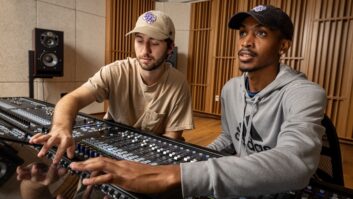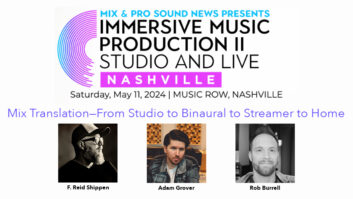For years, the November Mix has focused on audio education, and in the past, I’ve written on the subject as an outsider. However, after a year of part-time teaching, I have a new perspective.
There were few audio schools when most seasoned audio pros began their careers, leading some to be pessimistic about the value or necessity of a formal audio education. Today, it’s becoming more difficult to place an increasing number of graduates at a dwindling number of major recording facilities, so the question is whether audio schools provide the skills and experience to succeed as an audio professional.
Prior to this past year, I often answered this question by suggesting buying some gear and learning by doing. In reality, it’s probably easier to get a loan for college than it is to secure a loan for equipment and far easier for a parent to justify an investment in education rather than buying some very expensive toys.
Pro audio has always been an entrepreneurial industry — many people begin by freelancing, eventually starting their own businesses — and so for some, the goal is to be self-employable. It may be the hardest job to master, but it’s the most effective way to learn. As an added benefit, you can’t pass the buck: There’s no one to blame but yourself for lack of success.
But whatever path is chosen, experience is still the best teacher. There’s far more to learn than simply running the gear, not the least of which is that gear alone is not the key to one’s success.
THE TREASURE MAP
Some students really need help in terms of direction, focus and staying the course. The educational environment provides the map, focusing a student’s attention on the essentials: technique, hardware, software and hopefully some psychology and business skills. Schools let students make mistakes without the pressure of earning a living and without the scrutiny of paying customers. It also helps students determine which facet of the biz they are good at. One close-to-graduating student learned that his strength was not engineering, production or maintenance, but business. Fortunately, our school was able to nurture that facet. (See “Career Tips for Real-World Employment.”)
Before recording schools became common, our industry attracted music and audio enthusiasts. Going to school may be the fast-track to learning the essentials — certainly easier and more fun than cleaning ashtrays at the Record Plant — but the reality check occurs when it’s time to find a job. For as much love and passion anyone can have for this career choice, it still requires as much tenacity as you can muster.
Trust your instincts. Anything that makes you work too hard is reason to stop and regroup. Try to be picky about the people you work with. That may seem like a tall order, but working with quality people makes you look better as an engineer.
Eddie Ciletti teaches Advanced Production and Studio Maintenance at the Institute of Production and Recording in Minneapolis. Visit him at
www.tanglible-technology.com.
CAREER TIPS FOR REAL-WORLD EMPLOYMENT
Beyond the traditional recording industry jobs, there are new opportunities each day, from newly emerging distribution channels to the explosion of digital content development (such as ring tones). Here are some tips and techniques to assist the process of preparing your resume; think of it as “pre-production” for your career path.
Don’t lie on your resume. Be real about who you are and the work you do. To quote producer Rick Rubin, “Be the type of person that others want to open doors for.” Each time you apply for a new position, compile your most up-to-date personal and technical skill sets and distill your essence into a resume form. Save your enthusiasm for the personal interview.
When an opportunity arises, research everything you can about the artist, band or company before walking in the door to meet them. Understand a company’s “culture.” Know what they offer clients and the industry niche they service.
Avoid expressing too many career aspirations in early encounters with possible employers. Whichever job you take, focus on the value you’ll bring to the project or the company — don’t constantly talk about becoming the hottest producer on the planet.
Networking is not solely about the quantity of people you meet, but about developing quality relationships. The nature of your compassion can be equally demonstrated outside a professional relationship by asking about someone’s family, how they’re doing, et cetera. Remembering someone’s coffee preferences and presenting a cup to them before being asked once made me $26,000.
Be optimistic. No one wants to work with a bore or complainer. Smile. Keep negative opinions of others to yourself. You’re not going to get along with everyone, but understand that it’s a small, small world and demeaning commentary is hardly professional.
In reference to the above, never send out angry e-mails late at night. It takes approximately 23 seconds for that e-mail to be forwarded to the next 50 people who could have hired you. If there is a real concern, deal with the problem professionally and in person in a private environment.
No one likes to talk about money, but it is the first order of business. I started a practice of billing clients and updating their tab every day. With that consistency, everyone knows where the money is being spent and how fast. Because the subject is always out in the open, issues that come up can be dealt that same day while the facts are still fresh in everyone’s memory.
The most important client you have is the one you’re currently working with. A happy client’s word-of-mouth support may be worth more than that of the rich client you’ve been salivating over for months.
Also, it may be time to trade-in your old “koolkid17@hotmail” for the more professional “[email protected].” Apply the same graphic design elements to your Website, business cards and demo reel.
After sending the resume and cover letter, follow up in person. If you really want a job that’s way out of town, you must be willing to risk airfare and hotel accommodations — even for an entry-level position.
Scott Legere is the entertainment business curriculum coordinator at the Institute of Production and Recording.







